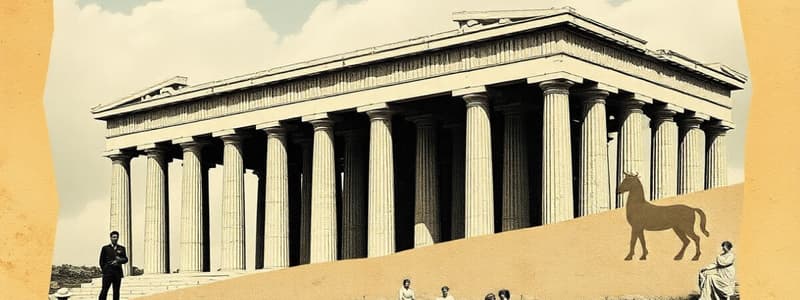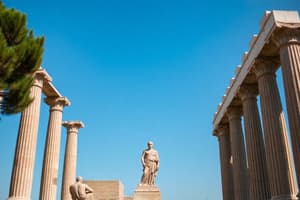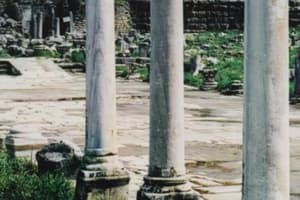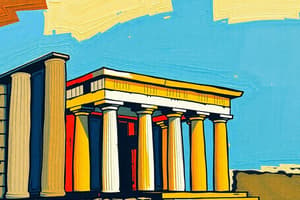Podcast
Questions and Answers
What was the primary purpose of the ancient Olympic Games?
What was the primary purpose of the ancient Olympic Games?
- To celebrate agricultural achievements
- To honor the gods and promote physical excellence (correct)
- To create alliances between different regions
- To serve as a political tool for city-states
What were hellanodikai responsible for during the Olympic Games?
What were hellanodikai responsible for during the Olympic Games?
- Training the athletes
- Preparing the venues for events
- Judging the athletic competitions (correct)
- Organizing ceremonial events
What were the hand weights used in the long jump called?
What were the hand weights used in the long jump called?
- Jumping weights
- Halterweights
- Halters (correct)
- Anklets
Which of the following was the site of the original ancient Olympic Games?
Which of the following was the site of the original ancient Olympic Games?
What is pankration?
What is pankration?
What type of races were held in the hippodrome during the ancient Olympic Games?
What type of races were held in the hippodrome during the ancient Olympic Games?
What did victorious chariot owners receive as a prize?
What did victorious chariot owners receive as a prize?
Who was known as the "god of horses" in ancient Greece?
Who was known as the "god of horses" in ancient Greece?
Flashcards are hidden until you start studying
Study Notes
Influence of Ancient Greece
- Foundation of Western civilization originated in Ancient Greece.
- Contributions span philosophy, art, politics, and sports, significantly shaping modern thought.
Philosophical Positions of the Body
- Body viewed as a crucial element in understanding human existence.
- Philosophers debated the relationship between body and soul, influencing later theories in metaphysics and ethics.
Socrates, Plato, and Aristotle
- Socrates emphasized the importance of self-examination and knowledge.
- Plato introduced the Theory of Forms, presenting an ideal realm alongside the physical world.
- Aristotle's works focused on logic, observation, and categorization, laying groundwork for scientific inquiry.
Two Important Greek City-States
- Athens known for its democratic governance and cultural achievements.
- Sparta recognized for its military discipline and distinct societal structure focused on warfare.
The Ancient Olympic Games (776 B.C. - 393 A.D.)
- First Olympic Games held in Olympia, celebrating athletic competition and honoring Zeus.
- Events included running, wrestling, boxing, and chariot racing, showcasing strength and skill.
- An essential cultural event that promoted unity among city-states.
Hellanodikai
- The referees responsible for overseeing the Olympic Games, ensuring fairness and adherence to rules.
Statues of Corrupt Athletes
- Statues lining the entrance of the games served as reminders and warnings against corruption, financed by penalties on dishonest competitors.
Wrestling and Single Defeat
- Wrestlers would strive to throw their opponent to the ground to achieve victory, emphasizing skill and technique.
First Day of the Games
- The initial day was dedicated to religious ceremonies and rituals honoring the gods.
Pankration
- A mixed martial art combining elements of wrestling and boxing, allowing a wide range of techniques in combat.
Chariot Race Structure
- Chariot races occurred at the Hippodrome, a specialized arena designed for this popular event.
Hand Weights for Long Jump
- Used by athletes to increase momentum, these weights were known as "Halteres."
Poet Mentioned
- Notable poets from this era often celebrated athletic victories in their works.
God of Horses
- Poseidon, revered as the god of horses or "horse whisperer," played a significant role in Greek mythology.
Training Accompaniment
- Athletes were often accompanied by the lyre, an instrument that marked the training process and competitions.
Olympic Games Overview
- Four major Panhellenic games included the Olympics at Olympia, Pythian at Delphi, Nemean at Nemea, and Isthmian at Isthmia, each offering different prizes (wreaths made from olive, bay, parsley, and pine, respectively).
Gradual Changes and End of the Olympics
- Evolution of events and societal values led to the decline of the Olympic Games by 393 A.D., coinciding with the rise of Christianity and changing cultural norms.
Contributions to Sports
- The ancient Greeks established organized sporting events, codified rules, and emphasized the importance of physical fitness as part of a well-rounded education.
Studying That Suits You
Use AI to generate personalized quizzes and flashcards to suit your learning preferences.




